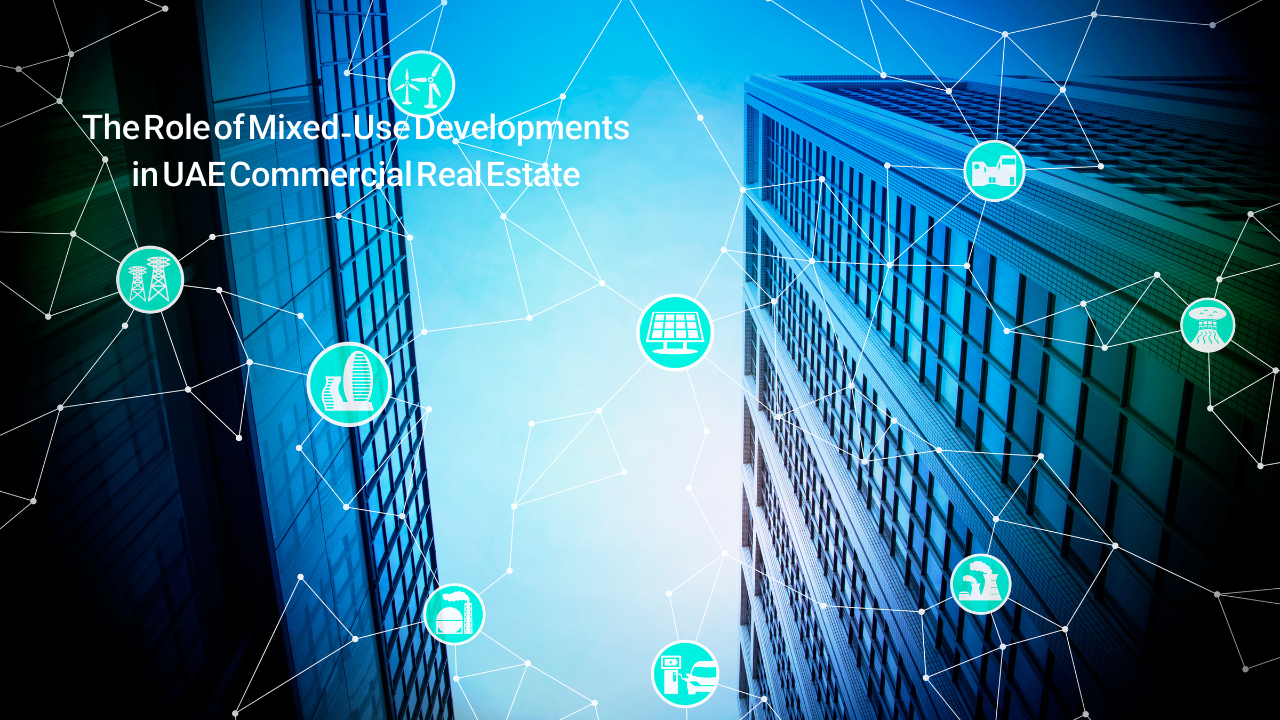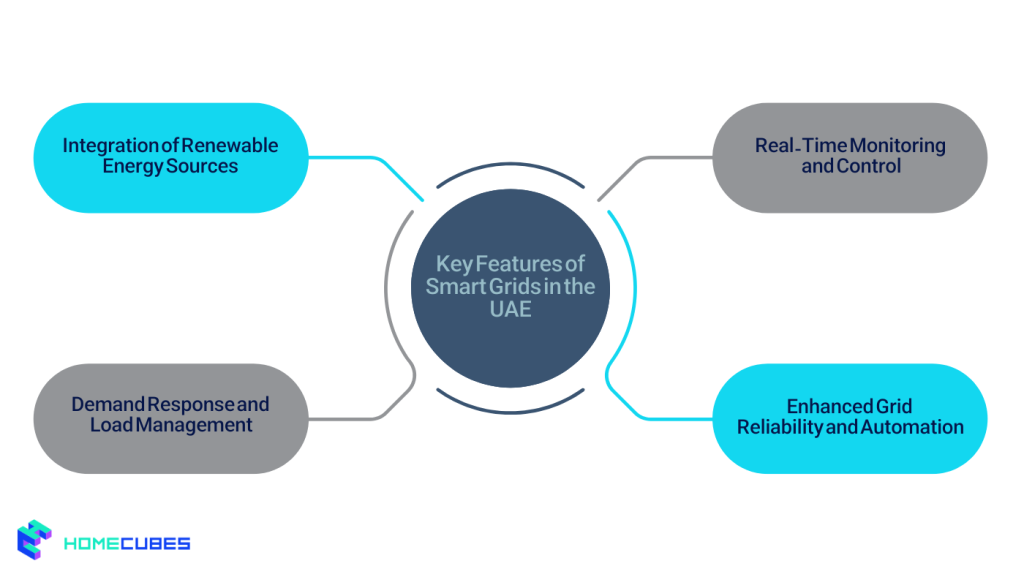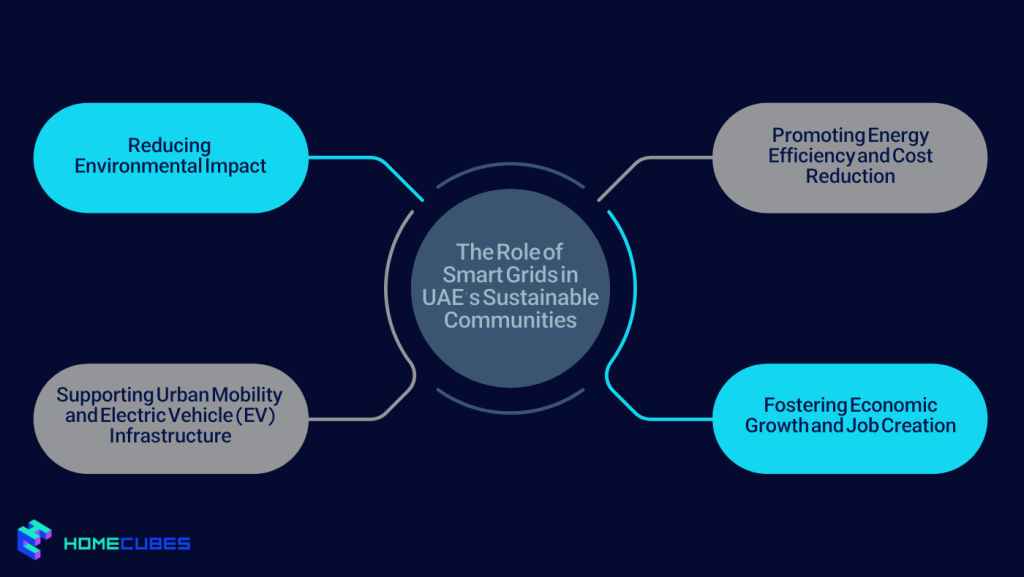

The UAE has long been a pioneer in embracing cutting-edge technologies and innovative solutions to promote sustainable development. As the country moves toward a more sustainable future, Smart Grids in UAE Sustainable Communities have become an essential component in managing energy consumption and optimizing the use of resources. Smart grids, with their ability to integrate renewable energy sources, improve energy efficiency, and enhance grid reliability, are transforming the UAE’s urban landscape. This article explores how smart grids play a vital role in the development of sustainable communities across the UAE, their benefits, challenges, and the future potential they hold.
As COP29 begins, we’re building on COP28’s legacy of ambitious climate progress 🌍
From renewable energy to sustainable water management and food security, the UAE is committed to climate action that benefits communities globally.
Together, let’s make COP29 a pivotal moment for… pic.twitter.com/ELnEMkd6ib
— UAE/Climate (@UAEClimate) November 11, 2024
Understanding Smart Grids and Their Role in Sustainable Development
Smart grids are advanced electrical grids that utilize digital communication technologies. They monitor, control, and optimize the generation, distribution, and consumption of electricity. They offer a more dynamic, flexible, and efficient energy system compared to traditional grids. In essence, smart grids enable real-time monitoring of energy usage, allowing for better energy distribution and management.
In the context of UAE Sustainable Communities, smart grids are not just about providing reliable energy. They are about enhancing the integration of renewable energy, reducing energy consumption, and promoting sustainability through advanced technology. The UAE’s commitment to reducing carbon emissions and becoming a leader in sustainable development is reinforced through the widespread adoption of smart grid systems in its urban areas.
The Importance of Smart Grids for Sustainable Communities
Sustainable communities are defined by their ability to balance economic growth, social inclusion, and environmental sustainability. In the UAE, creating such communities requires advanced energy solutions. They must not only reduce environmental impact but also promote efficient and equitable energy use. Smart grids align with these goals by enabling better energy management, promoting the use of renewable energy, and supporting initiatives to reduce waste and optimize resource use.
Key Features of Smart Grids in the UAE
Smart grids are characterized by several key features that make them highly beneficial for UAE Sustainable Communities. These features enhance the overall efficiency and sustainability of energy systems, leading to reduced environmental impact and greater energy security.

1. Integration of Renewable Energy Sources
One of the defining characteristics of smart grids is their ability to integrate renewable energy sources such as solar, wind, and geothermal energy. The UAE, with its abundant sunlight, has made significant strides in incorporating solar energy into its grid. Smart grids enable a more efficient integration of renewable sources. That would ensure that energy generated from these sources is distributed optimally across communities.
Benefits of Renewable Energy Integration
- Reduced Carbon Emissions: By increasing the share of renewable energy in the grid, smart grids help reduce greenhouse gas emissions, contributing to the UAE’s goal of achieving net-zero emissions by 2050.
- Energy Resilience: The ability to incorporate multiple renewable energy sources increases the resilience of the energy grid. That would make it less vulnerable to external disruptions.
- Cost Savings: Solar and wind energy can lower energy costs, especially as the UAE continues to expand its renewable energy infrastructure. Smart grids allow for more efficient management of these resources, optimizing energy distribution and storage.
2. Real-Time Monitoring and Control
Smart grids provide real-time monitoring and control of energy flow, which allows for immediate adjustments based on energy demand. This feature enables utilities to detect and address energy imbalances or outages more effectively. It also allows consumers to track their energy usage and make informed decisions about their consumption habits.
Benefits of Real-Time Monitoring
- Increased Efficiency: By providing constant feedback on energy usage, smart grids allow for adjustments that optimize the performance of the entire energy system.
- Reduced Waste: Real-time control helps prevent energy wastage, ensuring that energy is only distributed when and where it is needed.
- Faster Response to Emergencies: In the event of a power failure or disruption, smart grids can quickly identify the affected areas and restore power, reducing downtime.
3. Demand Response and Load Management
Smart grids can communicate directly with consumer devices and appliances, allowing for demand response and load management. By optimizing when and how electricity is consumed, smart grids help prevent overloading the grid during peak hours, reducing the likelihood of blackouts or brownouts.
Benefits of Demand Response
- Energy Conservation: By adjusting energy consumption based on real-time data, smart grids encourage consumers to reduce their energy use during peak periods.
- Lower Energy Costs: With more efficient use of energy, consumers can lower their electricity bills. Utilities may offer incentives to encourage off-peak usage, creating a more affordable energy system.
- Grid Stability: Demand response helps ensure that the grid remains balanced, preventing outages and improving overall reliability.
4. Enhanced Grid Reliability and Automation
Smart grids are designed to be highly reliable. That would be through automatic systems in place to identify faults and reroute energy as needed. Automation allows for quicker recovery from power disruptions, reducing the impact on communities. The self-healing capability of smart grids ensures that the grid can restore power without manual intervention.
Benefits of Enhanced Reliability
- Reduced Downtime: Automated systems can quickly detect and address faults, restoring power in a matter of minutes instead of hours.
- Increased Consumer Satisfaction: With fewer disruptions to power supply, residents and businesses benefit from a more stable and reliable energy system.
- Better Resource Allocation: Automated systems can allocate energy where it is needed most, optimizing the grid’s performance during peak demand.
The Role of Smart Grids in UAE’s Sustainable Communities
Smart grids play a central role in driving sustainability efforts in UAE communities. Their integration into urban planning and energy infrastructure is helping to create energy-efficient, sustainable neighborhoods. Here’s how they contribute to UAE Sustainable Communities:

1. Reducing Environmental Impact
The UAE has committed to reducing its carbon footprint and achieving net-zero emissions by 2050. Smart grids are an essential part of this strategy, as they enable a more efficient and sustainable use of energy. By integrating renewable energy sources and optimizing energy consumption, smart grids reduce reliance on fossil fuels and lower emissions.
Supporting the UAE’s Vision for Sustainability
- UAE Vision 2021: Smart grids align with the UAE’s Vision 2021, which calls for sustainable development across the nation. The implementation of smart grid technology is key to reducing energy consumption and fostering eco-friendly urban living.
- Sustainable Cities: As part of the UAE’s focus on creating sustainable cities, smart grids help reduce the environmental footprint of urban areas. The use of smart grids in residential and commercial buildings helps achieve energy conservation goals and reduce waste.
2. Promoting Energy Efficiency and Cost Reduction
Smart grids improve energy efficiency by allowing for real-time monitoring and data analysis. This enables both consumers and utilities to identify areas where energy can be saved and make adjustments accordingly. In UAE’s sustainable communities, this leads to reduced energy bills for residents and businesses, as well as lower operational costs for utilities.
Energy Efficiency in Residential Communities
- Smart Homes: Many modern UAE homes are equipped with smart devices that work with the smart grid. These devices allow homeowners to monitor and control their energy usage remotely, promoting energy efficiency and reducing waste.
- Building Energy Management Systems (BEMS): Smart grids enable the integration of BEMS in commercial and residential buildings. These systems allow for better control over heating, ventilation, and air conditioning (HVAC), lighting, and other energy-consuming systems, leading to lower energy consumption and reduced operational costs.
3. Supporting Urban Mobility and Electric Vehicle (EV) Infrastructure
As the UAE embraces sustainable transportation, electric vehicles (EVs) are becoming increasingly popular. The impact of sustainable urban mobility on property value in Dubai and the UAE is pivotal, so is the utilization of smart grids. These grids can support EV charging infrastructure by optimizing the distribution of electricity for charging stations. The integration of EVs into the grid allows for better load management and more efficient use of electricity.
Benefits for Sustainable Transportation
- EV Charging Stations: Smart grids can optimize the charging of electric vehicles by managing the load and preventing grid overload during peak charging times.
- Vehicle-to-Grid Technology: In the future, smart grids may allow for vehicle-to-grid (V2G) technology, where EVs can store energy and feed it back into the grid during periods of high demand, contributing to energy stability.
4. Fostering Economic Growth and Job Creation
The shift toward smart grids and sustainable energy systems has a significant economic impact, creating new opportunities for businesses and job creation. The UAE’s commitment to smart grid development is opening up markets for energy technology firms, contractors, and engineers. Additionally, the growth of renewable energy sectors, such as solar powered high rises in Dubai and other areas across the country, is creating jobs in construction, manufacturing, and maintenance.
Economic Benefits for Sustainable Communities
- Job Creation in the Green Economy: The development and maintenance of smart grids and renewable energy projects provide a boost to the UAE’s green economy, offering employment opportunities in the energy and technology sectors.
- Attracting Investments: As the UAE continues to lead in sustainable development, it becomes an attractive destination for international investments in clean energy and technology. Smart grids support this growth by enhancing energy efficiency and creating a more reliable energy infrastructure.
Challenges in Implementing Smart Grids in UAE
While the benefits of smart grids are clear, their implementation comes with several challenges. Addressing these challenges is essential for the successful integration of smart grids into UAE’s sustainable communities.
1. High Initial Investment and Infrastructure Development
The implementation of smart grid technology requires substantial initial investment in infrastructure, technology, and training. This can be a barrier for both public and private sector players, especially in the early stages of development.
Overcoming the Investment Challenge
- Government Support: The UAE government has been proactive in providing incentives and support for renewable energy and smart grid projects. Public-private partnerships can help overcome financial barriers and accelerate development.
- Long-Term Returns: While the initial investment is high, the long-term benefits of energy efficiency, cost savings, and sustainability make the investment worthwhile.
2. Data Privacy and Cybersecurity
Smart grids rely on the collection and transmission of large amounts of data. This raises concerns about data privacy and cybersecurity. This is because sensitive information about energy usage patterns could be vulnerable to hacking or misuse.
Ensuring Data Protection
- Advanced Security Protocols: Smart grid systems must be equipped with advanced encryption and security features to protect user data and ensure the integrity of the system.
- Government Regulation: The UAE government must implement and enforce strict regulations on data privacy and cybersecurity to protect consumers and businesses from potential risks.
Final Thoughts
The role of Smart Grids in UAE Sustainable Communities is crucial in driving the country’s transition toward a more sustainable and energy-efficient future. By integrating renewable energy, promoting efficiency, and supporting economic growth, smart grids are transforming the UAE’s urban landscapes into models of sustainability. While there are challenges to overcome, such as high initial costs and cybersecurity concerns, the long-term benefits of smart grid technology make it an essential component of the UAE’s sustainability goals. As smart grids continue to evolve, they will play an increasingly vital role in shaping the future of sustainable communities in the UAE.
Homecubes has developed their property tokenization platform in full compliance with UAE regulation on asset tokenization focusing on the Dubai real estate market. Contact us at your earliest possible to take advantage of such a lucrative fractional investment opportunity in premium properties across Dubai.










